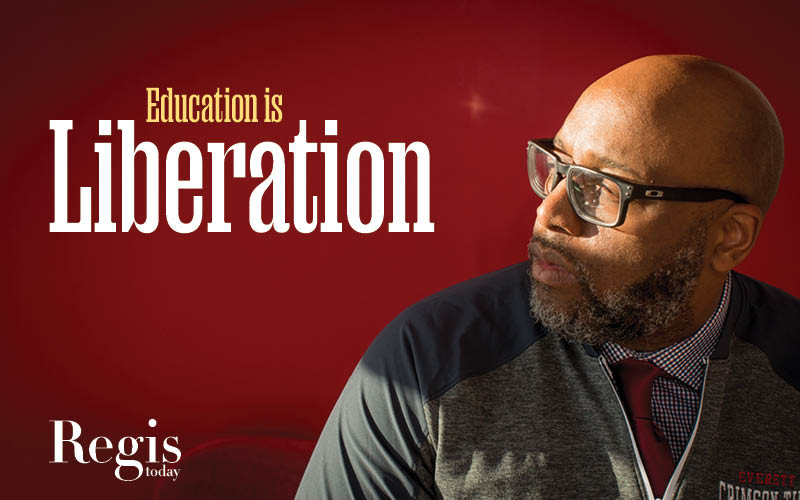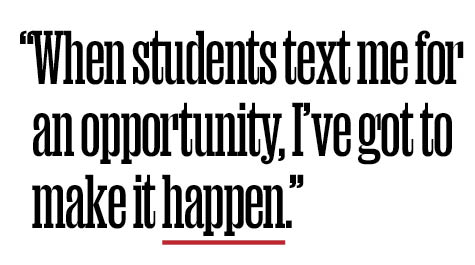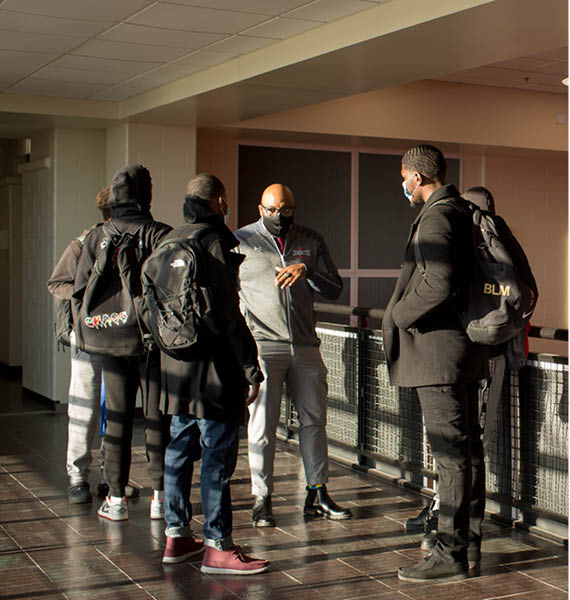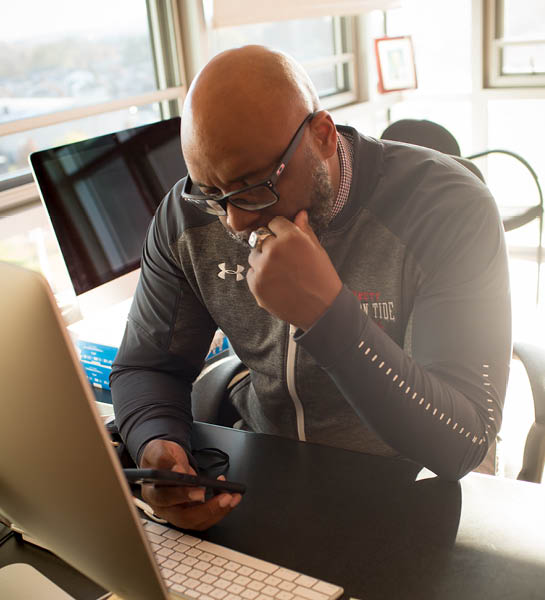
Story by Kristen Walsh | Photos by Kathleen Dooher
When Cory McCarthy, MEd ’21, EdD ’24 was packing to move to a new apartment in Winthrop, Massachusetts, he got rid of his collection of first-place coaching trophies but held on to the second-place ones. It might sound odd, but for McCarthy, it’s a mental reminder to keep working hard.
“I have to remember the times I didn’t win; it keeps me hungry,” McCarthy says. That kind of philosophy has informed more than two decades of McCarthy’s work to help change the societal narrative for underserved students. His current role is chief equity officer for Everett Public Schools (EPS).
“When students text me for an opportunity, I’ve got to make it happen,” he says. “Our school system is 84 percent students of color, and I have to make all of my students feel seen and valued. That’s really what equity is: making them feel like they have everything they need and following through with the opportunities to make that happen.”
McCarthy’s job description includes “leading the district’s efforts to sustain a culture of equity and inclusion for all students by narrowing the gaps between the highest and lowest performing students and by eliminating the racial disproportionality between student groups that occupy the highest and lowest achievement categories.”
Just a few months into his new role, with the full support of Superintendent Priya Tahiliani, McCarthy created an antiracism and antidiscrimination tool that helps students, staff, and families report discrimination in a formalized manner that will be investigated by the Office of Equity with a follow-up action to ensure mental and physical safety. He is also exploring ways to make it harder for students to drop out of school, including The Day Six Program, a degree completion program that meets on Saturdays.
“We wanted to re-engage students who have dropped out of Everett Public Schools or have the potential to drop out,” McCarthy says. “Many students didn’t drop out because they couldn’t finish school; it was for a variety of reasons, like passing the MCAS test [Massachusetts Comprehensive Assessment System], navigating the COVID-19 pandemic, holding down jobs, and dealing with mental health issues. We were able to secure tutors to help students get that diploma.” The program will also include job readiness training, an opportunity to take college courses, and help with the college application process. “Participants are going to get an opportunity to be successful. If there’s one thing the pandemic taught us, it’s that technology provides more avenues toward success.”
A partnership with Benjamin Franklin Institute of Technology will supplement programs offered in Everett High School’s Career and Technical Education (CTE) program. Teachers in the CTE program will also have educational opportunities, including how to support English Language Learners.
“Our goal is to close the gap and make it harder for students to not be successful—and in the process, value them as thought partners to help them understand that they are part of the solution,” McCarthy says.
Diverse Perspectives
Since McCarthy understands firsthand how important it is for BIPOC [Black, Indigenous, People of Color] students to see teachers and staff members who look like them, he teamed up with the EPS curriculum and instruction director on a diversification initiative aimed at increasing the number of BIPOC educators.
 Last fall, McCarthy visited HBCUs [historically Black colleges and universities] in Washington D.C., Maryland, and Virginia to recruit educators and highlight benefits like loan reimbursement and signing bonuses. He also met with current EPS educators of color to gather ideas for creating a career pathway for them. In fall 2021, his department launched a Regis College partnership to offer tuition breaks for EPS staff members who enroll in Regis bachelor’s degree completion and master’s and doctorate programs (see sidebar).
Last fall, McCarthy visited HBCUs [historically Black colleges and universities] in Washington D.C., Maryland, and Virginia to recruit educators and highlight benefits like loan reimbursement and signing bonuses. He also met with current EPS educators of color to gather ideas for creating a career pathway for them. In fall 2021, his department launched a Regis College partnership to offer tuition breaks for EPS staff members who enroll in Regis bachelor’s degree completion and master’s and doctorate programs (see sidebar).
“By diversifying our teaching staff, we are able to value the journey of educators who look like the majority of our students,” McCarthy says, citing research by The Center for Black Educator Development. “Black and Brown elementary school students who get with an educator who looks like them are three times more likely to finish high school; and if they get three of them in K through 12 they are 35 percent more likely to enroll in college. White students also benefit from having educators of color by adding another enriching and influential perspective.”
Liberating Inroads
McCarthy has more than two decades of experience working to change the societal narrative for urban youth. Spend a few minutes with him, and it’s evident that he has a special way of creating inroads with students. His approach? “I value their lived experiences and I’m curious about their world,” McCarthy says.
Part of that gets very personal.
“Even though I look like them, students think I have it all together,” McCarthy says. “But I want them to know that whatever the lowest point of their life is, I’ve experienced something similar. I remember not having anything—not having an allowance, having one pair of pants to wear during my entire freshman year of high school. But I didn’t let that stop me.”
McCarthy was born in Barbados and moved to Dorchester, Mass-achusetts, at age 11. “My dad died when I was young,” he recalls, still emotional about the loss. “My mom had to pick up a second job and she really trusted me and my brother and sisters to do well.”
In eighth grade McCarthy took a job as a custodian in his middle school. “Cleaning the school that you go to—I was a target for bullying but I didn’t get bullied because I didn’t respond,” McCarthy says. “I knew I was making seven dollars an hour and I would be able to buy shoes for the school dance. I was always mindful of where I wanted to be and nothing was going to stop me—even at my lowest times.”
On a lighter note, McCarthy jokes about his own motivation during high school. “My reason to go to college was to be in a space where my mother couldn’t shut the light off at night or tell me to clean my room, and I had three meals a day.”
Once there, his perspective changed. “I stayed in college to build relationships and get a college degree so I could have whatever job I wanted when I got older. Education is liberation.”
Unbiased Education
McCarthy followed his bachelor’s degree from University of Massachusetts Amherst with a master’s in education leadership at Endicott College before enrolling in the Master of Education (MEd) in Student Success at Regis College in 2019.
“My experience in the Student Success Program allowed me to apply 21st-century skills, research, and theoretical frameworks to my passion for K through 12 education,” says McCarthy. “I was able to create a vision for Black and Brown students to close the opportunity gaps K through career.”
At the time, McCarthy was a director of operations, climate and culture for Boston Public Schools (BPS) New Mission High School and took advantage of a BPS Regis partnership like the one he would later develop for EPS staff.
“The Regis MEd was a game changer for me,” McCarthy says. “It was unbiased, equitable, and designed to truly support students who walk into higher education with anxiety feeling as if there is no end goal.”
Sustainable Impact
McCarthy’s early career as director of athletics at New Mission High School included serving as head coach for the boys’ basketball team, including winning five state titles.
“My proudest moment wasn’t when my student-athletes won the championships, it was when the majority of the players I coached went to college and graduated,” McCarthy says.
After completing the Regis MEd, McCarthy joined Everett Public Schools as vice principal in 2020. Though school was fully remote due
to the pandemic, he built relationships by making impromptu outdoor visits to students’ homes and increasing accessibility by having weekend and evening office hours for students and families.
“I’ve developed this framework in my brain; I call myself ‘the union for the students’—someone who is willing to do everything possible for them to be successful,” McCarthy says.
But nicknames aren’t something that he reserves for himself. Throughout McCarthy’s career, he has assigned students names of colleges and universities to help keep them motivated.
“My goal is for students to see that we believe in them,” McCarthy says. “If they want to go to college, it’s my job to help them build a framework that inspires them to work hard to do what it takes to reach their goal—whether that’s college, a trade, or another career path.”
Sometimes that goal eventually leads students back to McCarthy. “I’m so proud when my former students go on to become educators—and it’s a lot of them. We are giving them jobs; we have that similar approach. It’s an incredible full circle moment.”
Sustainability of diversity programming is top of mind in his role as chief equity officer. He developed an equity task force of principals, staff, students, and community leaders to help ensure that happens.
“If I stayed as vice principal, a lot of my impact would have left when I left that role,” says McCarthy, who is currently enrolled in the Regis Doctor of Education in Higher Education Leadership. “I’m now working with the superintendent to develop a vision for K through 12 students and beyond. The EPS student will be a student who has access, who has opportunity, who understands and responds to injustice, and who’s going to advocate
for themselves.”
REGIS Partnership
A Regis College partnership with Everett Public Schools (EPS) provides EPS members—including spouses and children—with a discount of 25 percent off their tuition before financial aid. Additional aid can be awarded for those who qualify as members of the EPS Diversification Initiative. Opportunities include:
- Bachelor’s degree completion in education, elementary education, secondary degree (with licensure), child development, and humanities
- Master’s degree in student success, educational leadership, and special education (with licensure)
- EdD in Higher Education Leadership
Read more articles
Read the entire magazine online